Ignoring water damage repairs can lead to staggering costs, averaging $20,000 or more. Delayed action risks severe structural damage, mold growth, and health hazards. Water infiltrates your home, compromising foundational stability and increasing repair expenses over time. Mold, thriving in damp conditions, can cause respiratory issues within 24 to 48 hours of moisture exposure. Furthermore, this negligence can complicate insurance claims and lead to a decrease in property value. To safeguard your home and health, addressing water damage immediately is essential. Understanding the full implications can help you make knowledgeable choices moving forward.
Understanding Water Damage
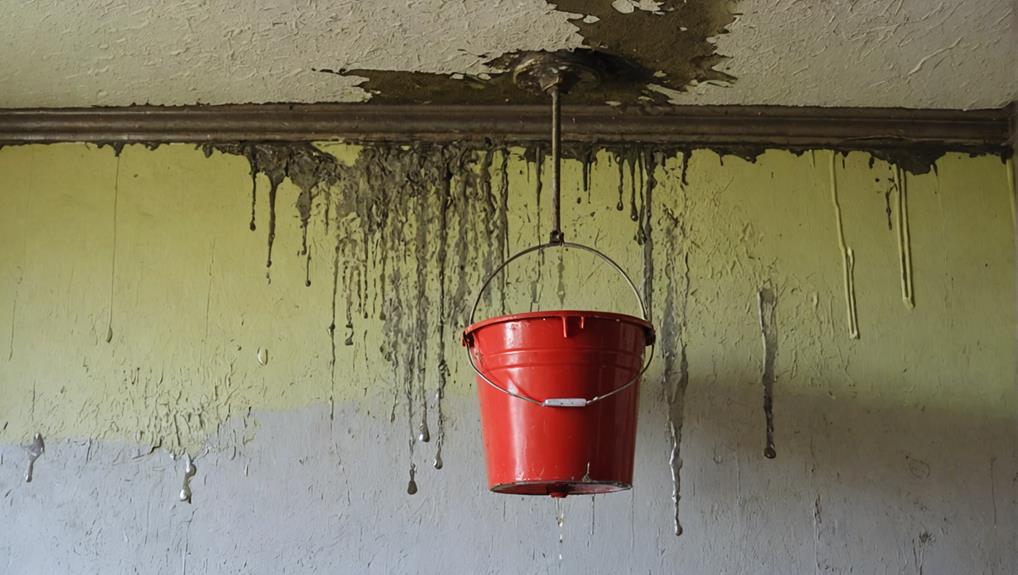
Water damage can occur in various forms, from minor leaks to catastrophic flooding, and understanding its implications is crucial for any property owner. The urgency of recognizing these signs cannot be overstated; early intervention can save you from costly repairs and health hazards. Water damage prevention starts with regular inspections of your property. Look for signs of moisture, mold, and water stains, and don't ignore even the smallest leaks—these can escalate quickly.
Once water damage occurs, restoration techniques become critical. You'll need to act fast; water can warp structures, promote mold growth, and compromise your property's integrity. It's not just about drying things out; effective restoration requires removing damaged materials, treating affected areas, and ensuring your home is safe for occupancy.
Understanding the nuances of water damage isn't just about knowing the risks; it's about taking proactive steps to shield your home from potential disasters. You owe it to yourself and your property to stay informed and vigilant. Don't wait until it's too late; prioritize water damage prevention and familiarize yourself with restoration techniques to protect your investment and peace of mind.
Common Causes of Water Damage
Water damage can occur from various sources, and it's essential to recognize them before they escalate. Common culprits include plumbing system failures, severe weather events, and appliance malfunctions, each capable of causing significant destruction. Staying vigilant about these risks can help you mitigate the impact and prevent costly repairs down the line.
Plumbing System Failures
Neglecting plumbing system failures can lead to catastrophic water damage. You might not think a small leak could escalate, but over time, it can wreak havoc on your home. One of the most common culprits is pipe corrosion. Aging pipes, especially those made of galvanized steel or copper, can corrode as a result of mineral buildup or chemical reactions. As they weaken, tiny leaks can form, often going unnoticed until significant damage has already occurred.
Effective leak detection is essential for preventing these issues. Regular inspections can help you catch leaks before they spiral out of control. Look for signs such as water stains, mold growth, or unusual spikes in your water bill. If you notice these warning signs, don't hesitate to call a professional for a thorough assessment.
Ignoring these plumbing problems is like playing with fire; the longer you wait, the more extensive the damage can become. Keep in mind that the cost of repairs from unchecked water damage can far exceed the expense of proactive maintenance. Act now to protect your home and your peace of mind.
Severe Weather Events
Severe weather events can release devastating water damage on homes, often catching homeowners off guard. Whether it's a torrential downpour, a sudden snowmelt, or an unexpected hurricane, the risks are real and immediate. You may think your home is safe, but without proper flood preparedness, you could face significant structural damage, mold growth, and costly repairs.
To mitigate these risks, investing in storm resilience is essential. Start by evaluating your property for vulnerabilities, such as inadequate drainage systems or poorly sealed windows. Elevating electrical systems and installing sump pumps can likewise be lifesavers during heavy rain.
It's not just about reacting after the storm hits; proactive measures can save you time, money, and heartache. Keep emergency supplies ready and develop a clear plan for evacuation if necessary. Remember, water damage can escalate quickly, and what starts as a small leak can turn into a major disaster if ignored. Take action now, and make sure your home is equipped to withstand nature's fury. Don't let severe weather catch you unprepared—your home deserves better.
Appliance Malfunctions
Appliance malfunctions can wreak havoc on your home, often leading to unexpected water damage that's costly to repair. When appliances like your washing machine, dishwasher, or refrigerator develop leaks, the results can be disastrous. You might not notice the issue until it's too late, causing water to seep into walls, floors, and ceilings.
That's why regular appliance maintenance is essential. Keeping an eye on hoses, connections, and seals can help you catch potential issues before they escalate. Don't wait for a puddle to form; proactive checks could save you thousands in repairs.
Investing in leak detection systems is another smart move. These devices can alert you to any leaks, giving you precious time to act before significant damage occurs. Remember, ignoring small leaks or signs of malfunction can lead to mold growth, structural damage, and expensive restoration costs.
Immediate Effects on Your Home
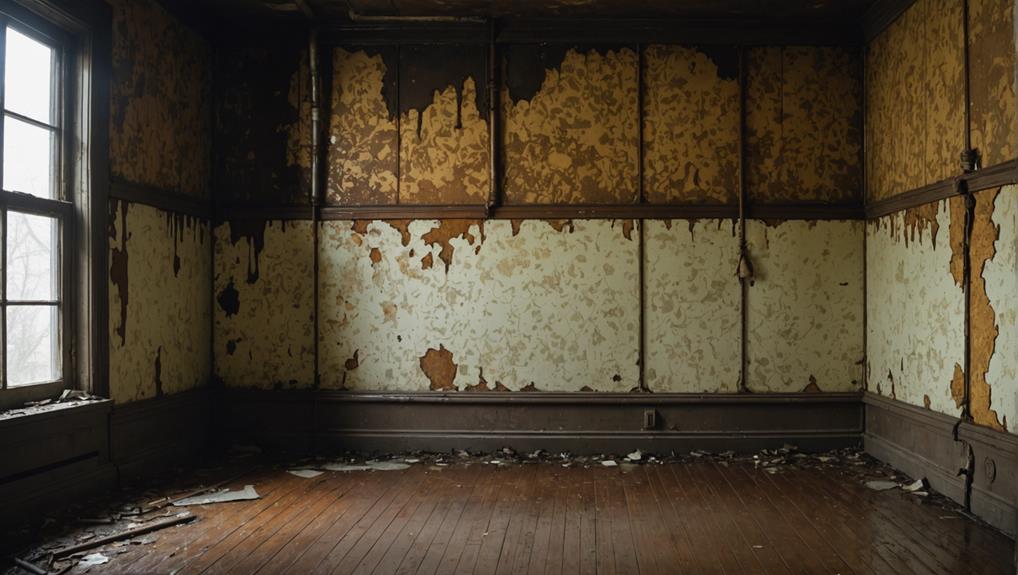
Ignoring water damage repairs can severely compromise your home's structural integrity, leading to costly consequences. In addition, standing moisture creates an ideal environment for mold growth, which poses serious health risks. Addressing these issues immediately is essential to safeguarding both your property and your well-being.
Structural Integrity Risks
Water damage can compromise your home's structural integrity in ways that are often underestimated. When water seeps into walls, floors, or your foundation, it can lead to severe issues that require immediate attention. Ignoring these problems can jeopardize not just your home's value but your safety as well.
Here's a quick breakdown of the risks associated with water damage:
| Risk | Impact | Repair Urgency |
|---|---|---|
| Foundation Stability | Weakening of support structures | High |
| Wall Integrity | Warping and structural failure | Medium |
| Floor Damage | Buckling and potential collapse | High |
Neglecting repairs can lead to increased costs down the line as the damage worsens. A compromised foundation can create an unstable environment, leading to cracks, shifts, and even collapse. The urgency of repairs cannot be overstated; proactive measures today guarantee the safety of your home tomorrow. Don't wait until it's too late—address water damage now to protect your family and your investment.
Mold Growth Potential
When it comes to water damage, one of the most immediate and concerning effects is the potential for mold growth. Mold thrives in damp environments, and if you ignore water damage repairs, you're effectively creating a breeding ground for it. Within just 24 to 48 hours of exposure to moisture, spores can begin to colonize, leading to health risks for you and your family.
To combat this, you need to implement effective mold prevention strategies. First, make sure that any leaks or water damage are addressed immediately. Next, focus on indoor humidity control; keeping humidity levels below 60% can greatly hinder mold growth. Use dehumidifiers in particularly moist areas, like basements or bathrooms, and make certain proper ventilation throughout your home.
Ignoring these steps isn't just a gamble with your property—it's a risk to your well-being. Mold can cause respiratory issues, allergies, and other serious health concerns. Taking swift action is essential; it's not just about protecting your home, but likewise safeguarding your family's health. Don't let mold find a home in your space—act before it spreads.
Long-Term Structural Consequences
Neglecting to address water damage can lead to severe long-term structural consequences that compromise the integrity of your home. When water infiltrates your property, it can weaken the foundation, resulting in foundation instability. This instability not only jeopardizes the safety of your living space but can likewise create a domino effect, causing walls and ceilings to crack or bow.
As these structural issues progress, you may find yourself facing expensive repairs down the line. Furthermore, the longer you wait to tackle water damage, the more likely it is that your home will suffer from property devaluation. Potential buyers often shy away from homes with a history of water damage, and this can greatly reduce your property's market appeal.
Ignoring these urgent repairs is like ignoring a ticking time bomb. You might think you're saving money now, but the reality is that the costs will accumulate—both regarding physical repairs and lost value. Prioritizing water damage repairs isn't just about preserving your home; it's about safeguarding your investment and ensuring a safe, stable environment for you and your loved ones.
Financial Implications of Delayed Repairs
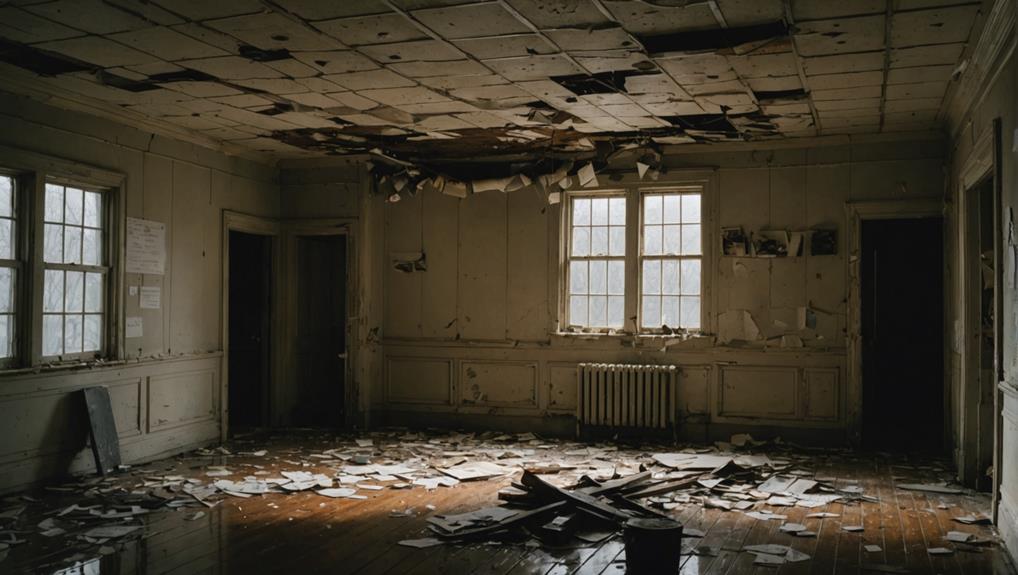
Delaying repairs for water damage can lead to significant financial burdens that accumulate rapidly over time. You might think postponing these repairs saves you money, but the reality is quite the opposite. Ignoring water damage can escalate into a financial nightmare, jeopardizing your financial planning.
Here are four vital financial implications of delaying repairs:
- Increased Repair Costs: The longer you wait, the more extensive the damage becomes, leading to higher repair costs that could have been avoided.
- Decreased Property Value: Unattended water damage can severely diminish your home's market value, making it harder to sell in the future.
- Higher Utility Bills: Water leaks and damage can result in increased utility bills, draining your finances even further each month.
- Insurance Complications: Ignoring repairs may lead to complications with your insurance coverage, potentially resulting in denied claims when you need them most.
In light of these realities, it's essential to address water damage promptly. Prioritize repairs to safeguard your finances and future stability.
Health Risks From Mold Growth
Mold growth is a silent but dangerous consequence of water damage that can pose serious health risks. If you've experienced any water intrusion, it's imperative to act quickly. Mold can start to develop within 24 to 48 hours, and the longer you wait, the worse the situation can become. This isn't just about your home; it's about your health.
Exposure to mold can trigger a range of health symptoms, such as respiratory issues, skin irritation, and even severe allergic reactions. Being aware of these health symptoms is significant. If you notice unexplained coughing, sneezing, or skin rashes, it may be time to investigate further.
Implementing mold prevention strategies is critical to safeguard your well-being. Guarantee proper ventilation in damp areas, fix leaks immediately, and use dehumidifiers where necessary. Regularly inspect your home, especially in hidden areas like basements and attics, where moisture can accumulate unnoticed.
Ignoring water damage repairs isn't just a financial risk; it can lead to significant health complications. Don't wait until it's too late—make mold prevention a priority for a safer living environment. Your health deserves it.
Insurance Coverage Considerations
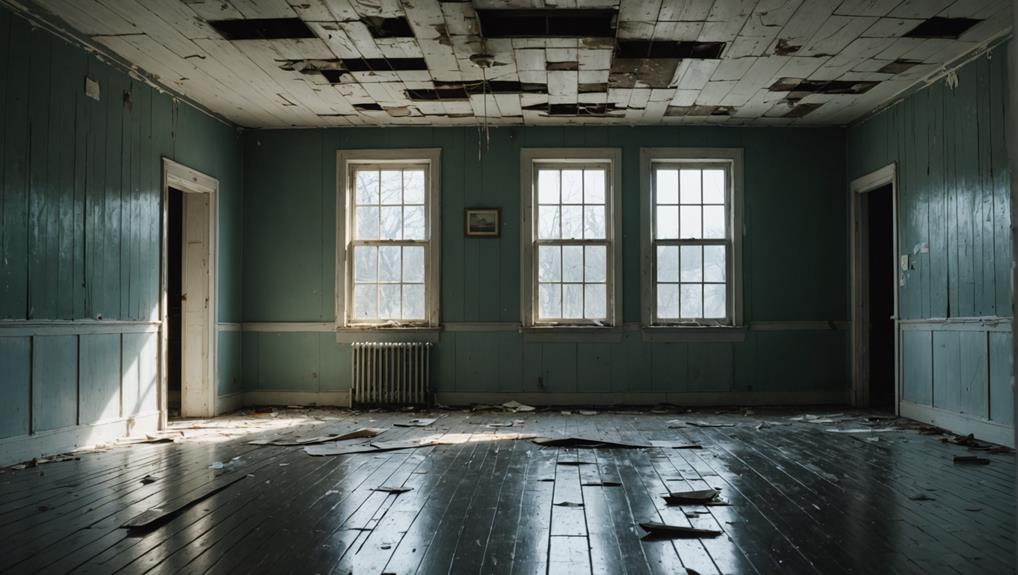
Many homeowners underestimate the importance of understanding their insurance coverage when it comes to water damage repairs. It's essential to know what your policy entails to avoid financial pitfalls. Here are some key aspects you should consider:
- Coverage Limits: Check your policy to see the maximum amount your insurance will pay for water damage. Many policies have specific limits that might fall short of your repair needs.
- Types of Damage Covered: Understand whether your policy covers sudden leaks or only specific types of water damage, like from storms or flooding.
- Deductibles: Be aware of how much you'll need to pay out-of-pocket before your insurance kicks in. A high deductible can leave you vulnerable.
- Claims Process: Familiarize yourself with the steps required to file a claim. Delays in reporting or insufficient documentation can hinder your chances of receiving compensation.
Ignoring water damage repairs may lead not just to structural issues but likewise to complications within your insurance claims process. It's essential to take action promptly to safeguard both your home and your finances.
Preventive Measures to Take
Taking proactive steps to prevent water damage can save you considerable time and costs in the long run. One of the most effective strategies is to schedule routine inspections of your property. By regularly checking for leaks, cracks, or signs of moisture intrusion, you can catch potential issues before they escalate. Don't wait for obvious signs of trouble; inspect your roof, plumbing, and foundation annually.
Moisture control is also essential. Verify your gutters are clean and functioning properly to direct water away from your home. Consider installing a dehumidifier in damp areas like basements or crawl spaces, as this can greatly reduce humidity levels and minimize the risk of mold growth.
Furthermore, check your home's ventilation systems. Proper airflow can help prevent moisture buildup in enclosed spaces. Use exhaust fans in kitchens and bathrooms to dissipate humidity right away.
Lastly, if you notice any unusual dampness or musty odors, don't ignore them. Addressing these concerns promptly will protect your home and your peace of mind. Remember, the cost of prevention is always less than the price of repairs.
When to Call a Professional
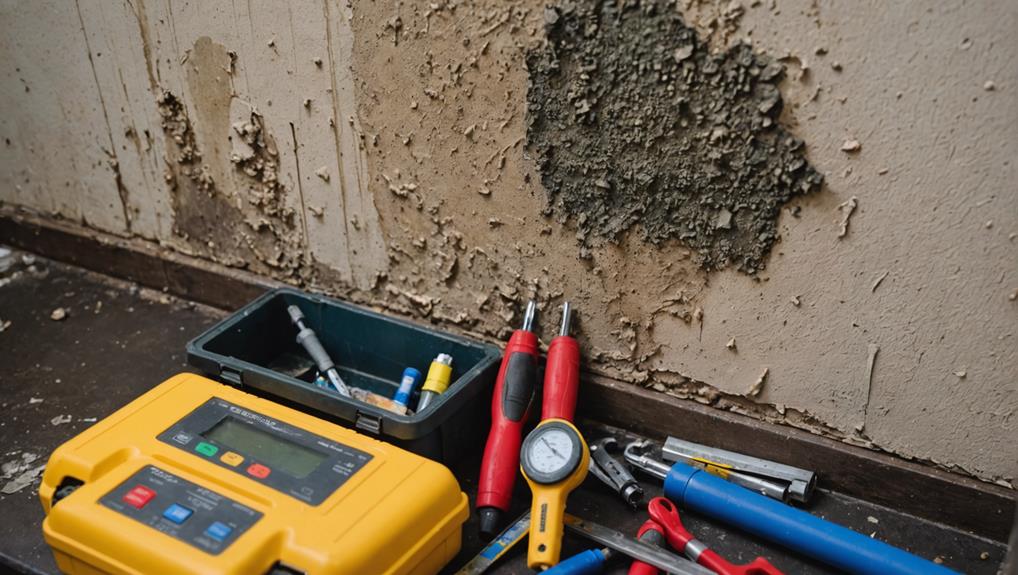
Even with diligent preventive measures in place, there are times when water damage issues exceed what can be managed on your own. Recognizing these moments is vital to preserving your home and preventing costly repairs down the line. Here are four indicators that it's time to call a professional:
- Severe Water Accumulation: If you're dealing with standing water or extensive flooding, it's critical to get help immediately.
- Mold Growth: The presence of mold can lead to serious health issues. If you notice mold developing, don't hesitate to seek professional assessments.
- Structural Damage: If you see sagging ceilings, warped walls, or buckling floors, these signs indicate damage that requires expert evaluation.
- Unpleasant Odors: Persistent musty smells often signal hidden water damage that needs urgent attention.
Ignoring these signs can lead to longer repair timelines and higher costs. By reaching out to professionals, you guarantee a thorough assessment and effective remediation, protecting your home from further deterioration. Don't wait until it's too late; invest in your property's safety and value today.
Conclusion
Ignoring water damage repairs can be like letting a small crack in a dam grow unchecked; it may seem minor, but the consequences can be catastrophic. You can't afford to wait, as the structural integrity of your home and your health are at stake. Don't let a trickle turn into a flood of expenses and hazards. Take action now—addressing water damage promptly is the key to safeguarding your investment and well-being.
